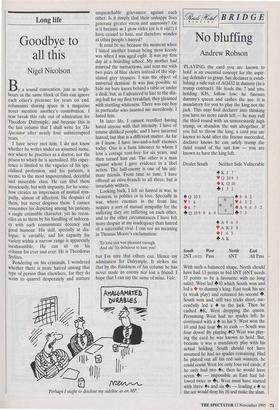Long life
Goodbye to all this
Nigel Nicolson
By a sound convention, just as neigh- bours in the same block of flats can ignore each other's presence for years on end, columnists sharing space in a magazine never mention another's contribution. I now break this rule out of admiration for Theodore Dalrymple, and because this is the last column that I shall write for The Spectator after nearly four uninterrupted years.
I have never met him. I do not know whether he writes under an assumed name, nor where he practises as a doctor, nor the prison to which he is accredited. His exper- ience is limited to the vagaries of his spe- cialised profession, and his patients, it seems, to the most impoverished, deceitful and miserable class. He can libel them atrociously, but with impunity, for he some- how creates an impression of mutual sym- pathy, almost of affection. He despairs of them, but never despises them. I cannot remember his depicting among his patients a single estimable character, yet he recon- ciles us to them by his handling of indecen- cy with such consummate decency and good humour. His skill, specially at dia- logue, is enviable, and his capacity for variety within a narrow range is apparently inexhaustible. He can sit on his column for ever and ever. He is Theodorus Stylites.
Pondering on his criminals, I wondered whether there is more hatred among that type of person than elsewhere, for they do seem to quarrel desperately and nurture unquenchable grievances against each other. Is it simply that their unhappy lives generate greater stress and animosity? Or is it because as I grow older (or is it old?) I have ceased to hate, and therefore wonder at other people's hatred?
It must be so, because the moment when I hated another human being most keenly was when I was aged eight. It was my first day at a boarding school. My mother had misread the instructions, and sent me with two pairs of blue shorts instead of the stip- ulated grey trousers. I was the object of universal derision. It was just possible to hide my bare knees behind a table or under a desk, but, as I advanced in line to the din- ing-hall for my first breakfast, they gleamed with startling whiteness. There was one boy in particular who taunted me mercilessly. I hated him.
In later life, I cannot recollect having hated anyone with that intensity. I have of course disliked people, and I have incurred hatred, but that is a different matter. As far as I know, I have two-and-a-half enemies today. One is a farm labourer to whom I lent a cottage rent-free for six years, and then turned him out. The other is a man against whom I gave evidence in a libel action. The half-enemy is one of his inti- mate friends. From time to time, I have offered an olive-branch to all three, but it invariably withers.
Looking back, I felt no hatred in war, in business, in politics or in love. Specially in war, where enemies in the front line acquire a sort of mutual sympathy for the suffering they are inflicting on each other, and in the other circumstances I have felt more despair at my inadequacy than hatred of a successful rival. I can see no meaning in Thomas Moore's exclamation: To love you was pleasant enough, And oh! 'tis delicious to hate you!
but I'm sure that others can. Hence my admiration for Dalrymple. It strikes me that by the frankness of his column he has never made an enemy nor lost a friend. I hope that I can say the same of mine. Vale.
Perhaps I ought to disclose my sideline as an MP.'


















































































 Previous page
Previous page